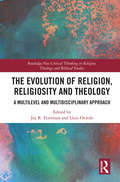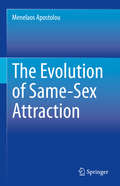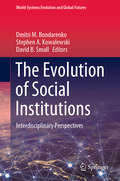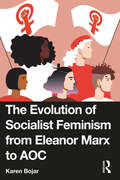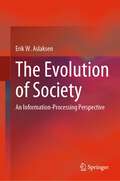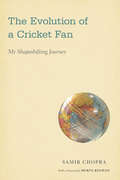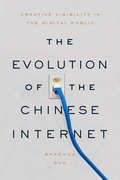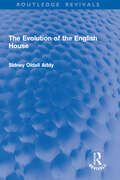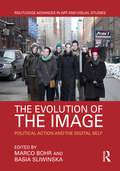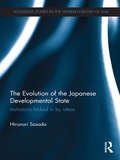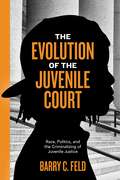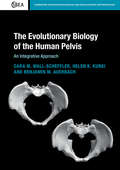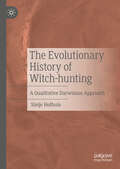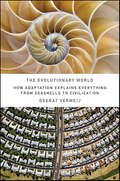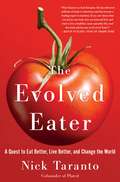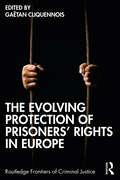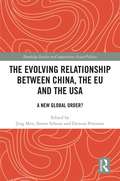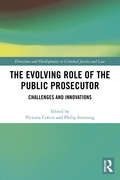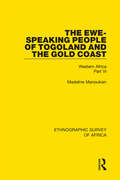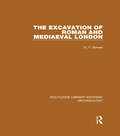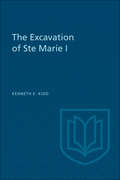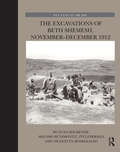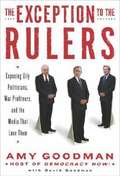- Table View
- List View
The Evolution of Religion, Religiosity and Theology: A Multi-Level and Multi-Disciplinary Approach (Routledge New Critical Thinking in Religion, Theology and Biblical Studies)
by Lluis Oviedo Jay R. FeiermanThis book takes a multi-dimensional and multi-disciplinary approach to religion, religiosity and theology from their earliest beginnings to the present day. It uniquely brings together the natural sciences and theology to explore how religious practice emerged and developed through the four sections into which the book is organized: Evolutionary biology; Philosophical linguistics, psychology and neuroscience; Theology and Anthropology. The volume features an international panel of contributors who develop an innovative picture of religion as a culturally-created social institution; religiosity as a more personal and subjective anthropological element of people expressed through religion; and theology as the study of god. To survive in changing times, living systems — a good characterization of religion, religiosity and theology — all must adaptively evolve. This is a vital study of a rapidly burgeoning field. As such, it will be of great interest to scholars in religious studies and theology as well as in the psychological, sociological, and anthropological study of religion.
The Evolution of Same-Sex Attraction
by Menelaos ApostolouThis book provides a comprehensive analysis of the evolutionary origins of same-sex attraction, evaluating multiple existing evolutionary theories. It combines empirical findings with theoretical arguments in order to review evidence on the prevalence rates of same-sex attraction and determine its genetic and environmental basis. Among the topics addressed:Attitudes towards same-sex attraction across human historyAssessing the weak selection pressures hypothesis of attractionAssessing the male choice hypothesis of attractionEvolution of same-sex attraction in men versus women The Evolution of Same-Sex Attraction will be of interest to academics and students of evolutionary and psychological sciences, filling a gap in literature on the origins of specifically same-sex attraction.
The Evolution of Social Institutions: Interdisciplinary Perspectives (World-Systems Evolution and Global Futures)
by David B. Small Dmitri M. Bondarenko Stephen A. KowalewskiThis book presents a novel and innovative approach to the study of social evolution using case studies from the Old and the New World, from prehistory to the present. This approach is based on examining social evolution through the evolution of social institutions. Evolution is defined as the process of structural change. Within this framework the society, or culture, is seen as a system composed of a vast number of social institutions that are constantly interacting and changing. As a result, the structure of society as a whole is also evolving and changing. The authors posit that the combination of evolving social institutions explains the non-linear character of social evolution and that every society develops along its own pathway and pace. Within this framework, society should be seen as the result of the compound effect of the interactions of social institutions specific to it. Further, the transformation of social institutions and relations between them is taking place not only within individual societies but also globally, as institutions may be trans-societal, and even institutions that operate in one society can arise as a reaction to trans-societal trends and demands. The book argues that it may be more productive to look at institutions even within a given society as being parts of trans-societal systems of institutions since, despite their interconnectedness, societies still have boundaries, which their members usually know and respect. Accordingly, the book is a must-read for researchers and scholars in various disciplines who are interested in a better understanding of the origins, history, successes and failures of social institutions.
The Evolution of Socialist Feminism from Eleanor Marx to AOC
by Karen BojarThe Evolution of Socialist Feminism from Eleanor Marx to AOC traces the intersection of feminism and socialism as it has played out in the socialist movements arising in Europe and North America in the nineteenth through early twenty-first centuries. From well-known figures in the history of socialism, such as Rosa Luxemburg, Sylvia Pankhurst, and Angela Davis, to lesser-known individuals including Claudia Jones, Sheila Rowbotham, and Zillah Eisenstein, this book examines the socialist feminists who have been among the most powerful voices insisting on freedom of expression and participatory democracy within the socialist movement as well as within the larger society. It considers how these figures contributed to what has become a twenty-first-century multiracial grassroots socialist feminist movement led by young women of color, playing a major role in radical movements across the globe.The Evolution of Socialist Feminism from Eleanor Marx to AOC is an important text for undergraduate students of politics, sociology, and gender studies, as well as for the general reader.
The Evolution of Society: An Information-Processing Perspective
by Erik W. AslaksenThis book covers the work of Erik W. Aslaksen who continues to develop the view of society and its evolution published in earlier work – The Social Bond (Springer 2018), The Stability of Society (Springer 2020), and Measures of Social Evolution (Springer 2021), bringing together core material of that work with the results of recent investigations in order to present the evolution of society as an integrated and continuous story leading right up to the present time. A story of human action driven by our beliefs, desires, and an ideology arising out of our ability to transform and exploit our environment through the development and application of technology. The distinguishing feature of the work is the treatment of society as an information-processing system and applying the system methodology for handling complexity, as it is applied, e.g., in engineering. This focus on information is particularly pertinent in the current circumstances, where the world has arrived at a critical point in its history through the conjunction of a number of issues that appear to be spiralling out of control: Global warming and the associated climate change, the destruction of our environment through such processes as land clearing and industrialisation with associated loss of biodiversity, the rapidly increasing visibility of the inequality in the quality of life with associated tensions, and above all, the determination of the US-led Western alliance to cling to its hegemonial role, apparently at all cost. With the sophistication and proliferation of nuclear weapons, the latter has the potential to bring on the end of civilisation as we know it. The resolution of any of these issues depends on the information available to all parties involved, and hence, the availability and quality of information is seen as the crucial and overarching issue of the present time. A number of aspects of this issue, including the role of education, economic inequality, and the control of the media, are treated in some detail, and proposals for some small steps in the right direction are put forward.
The Evolution of a Cricket Fan: My Shapeshifting Journey (Sporting)
by Samir ChopraSamir Chopra is an immigrant, a “voluntary exile,” who discovers he can tell the story of his life through cricket, a game that has long been an influence—really, an obsession—for him. In so doing, he reveals how his changing views on the sport mirror his journey of self-discovery. In The Evolution of a Cricket Fan, Chopra is thus able to reflect on his changing perceptions of self, and of the nations and cultures that have shaped his identity, politics, displacement, and fandom. Chopra’s passion for the sport began as a child, when he rooted for Pakistan and against his native India. When he migrated, he became a fan of the Indian team that gave him a sense of home among the various cultures he encountered in North America and Australia. This “shapeshifting” exposes the rift between the Old and the New world, which Chopra acknowledges is “cricket’s greatest modern crisis.” But it also illuminates the identity dilemmas of post-colonial immigrants in the Indian diaspora. Chopra’s thoughts about the sport and its global influence are not those of a player. He provides access to the inner world of the global cricket fan navigating the world that colonial empire wrought and that cricket continues to connect and animate. He observes that the Indian cricket team carries many burdens—not only must they win cricket matches, but their style of play must generate a pride that assuages generations of wounds inflicted by history. And Chopra must navigate where he stands in that history. The Evolution of a Cricket Fan shows Chopra’s own wins and losses as his life takes new directions and his fandom changes allegiances.
The Evolution of the Chinese Internet: Creative Visibility in the Digital Public
by Shaohua GuoDespite widespread consensus that China's digital revolution was sure to bring about massive democratic reforms, such changes have not come to pass. While scholars and policy makers alternate between predicting change and disparaging a stubbornly authoritarian regime, in this book Shaohua Guo demonstrates how this dichotomy misses the far more complex reality. The Evolution of the Chinese Internet traces the emergence and maturation of one of the most creative digital cultures in the world through four major technological platforms: the bulletin board system, the blog, the microblog, and WeChat. Guo transcends typical binaries of freedom and control, to argue that Chinese Internet culture displays a uniquely sophisticated interplay between multiple extremes, and that its vibrancy is dependent on these complex negotiations. In contrast to the flourishing of research findings on what is made invisible online, this book examines the driving mechanisms that grant visibility to particular kinds of user-generated content. Offering a systematic account of how and why an ingenious Internet culture has been able to thrive, Guo highlights the pivotal roles that media institutions, technological platforms, and creative practices of Chinese netizens have played in shaping culture on- and offline.
The Evolution of the English House (Routledge Revivals)
by Sidney Oldall AddyThe Evolution of the English House (1933) discusses the popular and native art in domestic English architecture, tracing the changes over the years. The focus is on plain wattled huts and combinations of dwelling-house and cattle-stall, as well as the great villas and picturesque timber houses of the wealthy. In this way the author establishes how the masses of the English people lived in past times.
The Evolution of the Human Head
by Daniel E. LiebermanIn one sense, human heads function much like those of other mammals. We use them to chew, smell, swallow, think, hear, and so on. But, in other respects, the human head is quite unusual. Unlike other animals, even our great ape cousins, our heads are short and wide, very big brained, snoutless, largely furless, and perched on a short, nearly vertical neck. Daniel E. Lieberman sets out to explain how the human head works, and why our heads evolved in this peculiarly human way. Exhaustively researched and years in the making, this innovative book documents how the many components of the head function, how they evolved since we diverged from the apes, and how they interact in diverse ways both functionally and developmentally, causing them to be highly integrated. This integration not only permits the head’s many units to accommodate each other as they grow and work, but also facilitates evolutionary change. Lieberman shows how, when, and why the major transformations evident in the evolution of the human head occurred. The special way the head is integrated, Lieberman argues, made it possible for a few developmental shifts to have had widespread effects on craniofacial growth, yet still permit the head to function exquisitely. This is the first book to explore in depth what happened in human evolution by integrating principles of development and functional morphology with the hominin fossil record. The Evolution of the Human Head will permanently change the study of human evolution and has widespread ramifications for thinking about other branches of evolutionary biology.
The Evolution of the Image: Political Action and the Digital Self (Routledge Advances in Art and Visual Studies)
by Basia Sliwinska Marco BohrThis volume addresses the evolution of the visual in digital communities, offering a multidisciplinary discussion of the ways in which images are circulated in digital communities, the meanings that are attached to them and the implications they have for notions of identity, memory, gender, cultural belonging and political action. Contributors focus on the political efficacy of the image in digital communities, as well as the representation of the digital self in order to offer a fresh perspective on the role of digital images in the creation and promotion of new forms of resistance, agency and identity within visual cultures.
The Evolution of the Japanese Developmental State: Institutions locked in by ideas (Routledge Studies in the Modern History of Asia)
by Hironori SasadaThe Japanese economy underwent a fundamental transition from a liberal economy to a developmental state system during World War II, and despite efforts by the American occupation forces to dismantle them after 1945, these elements of the wartime economic system remained in place. Through an historical institutionalist lens, this book examines the reasons why the key features of the Japanese developmental state, such as pilot agencies and industrial associations, continued to play key roles in the post-war Japanese economy. Further, it locates the fundamental roots of the developmental state system in wartime Manchuria and thus highlights how decisions made in the context of war continued to influence the direction of the Japanese economy over the following decades. Analysing the institutional origin and evolutionary path of developmental state system, The Evolution of the Japanese Developmental State extends existing scholarship on the institutions that were at the heart of the developmental state system by focusing on not just why they were important, but also how and why they were originally built. Based on extensive archival research in both Japan and the USA, including Japanese language collections not widely known in the West, it will be of great interest to students and scholars of political science, economic history, economics and Asian studies.
The Evolution of the Juvenile Court: Race, Politics, and the Criminalizing of Juvenile Justice (Youth, Crime, and Justice #4)
by Barry FeldFrom one of America&’s leading experts, an analysis of the history of the nation&’s juvenile justice system and a look at the future. The juvenile court lies at the intersection of youth policy and crime policy, and reflects our changing ideas about children and crime control throughout history. In The Evolution of the Juvenile Court, noted law professor and criminologist Barry C. Feldprovides a sweeping overview of the American juvenile justice system&’s development and change over the past century. Feld traces the juvenile court&’s evolution though its four periods―the Progressive Era, the Due Process Revolution in the 1960s, the Get Tough Era of the 1980s and 1990s, and today&’s Kids Are Different era. He examines the relationship between social structural factors—changes in the economy, cities, families, race and ethnicity, and politics—and their impact on juvenile justice policies and practices. A comprehensive analysis of juvenile justice history, The Evolution of the Juvenile Court draws on lessons from our past to envision a new, developmentally appropriate justice system for children. Winner, 2020 ACJS Outstanding Book Award, given by the Academy of Criminal Justice Sciences
The Evolution of the Primate Foot: Anatomy, Function, and Palaeontological Evidence (Developments in Primatology: Progress and Prospects)
by Daniel Schmitt Angel Zeininger Kevin G. Hatala Roshna E. WunderlichThe human foot is a unique and defining characteristic of our anatomy. Most primates have grasping, prehensile feet, whereas the human foot stands out as a powerful non-grasping propulsive lever that is central to our evolution as adept bipedal walkers and runners and defines our lineage. Very few books have compiled and evaluated key research on the primate foot and provided a perspective on what we know and what we still need to know. This book serves as an essential companion to “The Evolution of the Primate Hand” volume, also in the Developments in Primatology series. This book includes chapters written by experts in the field of morphology and mechanics of the primate foot, the role of the foot in different aspects of primate locomotion (including but not limited to human bipedalism), the “hard evidence” of primate foot evolution including fossil foot bones and fossil footprints, and the relevance of our foot’s evolutionary history to modern human foot pathology.This volume addresses three fundamental questions: (1) What makes the human foot so different from that of other primates? (2) How does the anatomy, biomechanics, and ecological context of the foot and foot use differ among primates and why? (3) how did foot anatomy and function change throughout primate and human evolution, and why is this evolutionary history relevant in clinical contexts today?This co-edited volume, which relies on the insights of leading scholars in primate foot anatomy and evolution provides for the first time a comprehensive review and scholarly discussion of the primate foot from multiple perspectives. It is accessible to readers at different levels of inquiry (e.g., undergraduate/graduate students, postdoctoral research, other scholars outside of biological anthropology). This volume provides an all-in‐one resource for research on the comparative and functional morphology and evolution of the primate foot.
The Evolutionary Biology of the Human Pelvis: An Integrative Approach (Cambridge Studies in Biological and Evolutionary Anthropology #85)
by Benjamin M. Auerbach Cara M. Wall-Scheffler Helen K. KurkiThis book provides a synthetic overview of all evidence concerning the evolution of the morphology of the human pelvis, including comparative anatomy, clinical and experimental studies, and quantitative evolutionary models. By integrating these lines of research, this is the first book to bring all sources of evidence together to develop a coherent statement about the current state of the art in understanding pelvic evolution. Second, and related to this, the volume is the first detailed assessment of existing paradigms about the evolution of the pelvis, especially the obstetric dilemma. The authors argue that there are many 'dilemmas', but these must be approached using a testable methodology, rather than on the proviso of a single paradigm. The volume clearly contributes to greater scientific knowledge about human variation and evolution, and has implications for clinicians working within reproductive health. A thought-provoking read for students, researchers and professionals in the fields of biological anthropology, human evolutionary anthropology, paleoanthropology, bioarchaeology, biology, developmental biology and obstetrics.
The Evolutionary History of Witch-hunting: A Qualitative Darwinian Approach
by Steije HofhuisWhy did early modern Europeans hunt for witches? Were these persecutions a shrewd tool to oppress women or the poor, or were they just a way of making money? Or were witch-hunters primarily driven by a genuine belief in witchcraft? The witches’ sabbath, the diabolical pact, and the nightly flight were elements in the early modern concept of witchcraft that seem to have been intelligently designed to trigger persistent witch persecutions. But in contrast to what many past historical scholars presumed, witch-hunts were not based on intelligent design. So how to explain them? This book proposes a new model: Darwinian cultural evolution. It contends that witch-hunting’s apparent design emerged from a hidden evolutionary process in which cultural variants which accidentally unleashed larger persecutions were cumulatively preserved. Witch-hunting did not so much evolve to serve human interests but to ensure its own ‘selfish’ reproduction. Historians have often compared witch persecutions to the outbreaks of contagious disease, but only as a figure of speech. But shouldn’t we take the similarities more seriously? This book argues that witch-hunting was a cultural ‘virus’ that spread at the expense of its human hosts, and thus bridges the gap between qualitative history and the burgeoning field of Darwinian cultural evolution.
The Evolutionary World: How Adaptation Explains Everything from Seashells to Civilization
by Geerat J. Vermeij"One of the master naturalists of our time" (American Scientist) reveals how evolutionary theory explains and affects not just the natural world but our society---and its future.Evolution has outgrown its original home in biology and geology. The Evolutionary World shows how evolution---descent with modification---is a concept that organizes, explains, and predicts a multitude of unconnected facts and phenomena. Adaptation plays a role not only in the development of new species but the development of human civilization. By understanding how evolutionary theory has played out in areas such as our economic system, our preparation for catastrophes, and even the development of communities, we can learn not just how these systems work but also what challenges lie ahead.Blind since the age of three, Dr. Geerat J. Vermeij has become renowned for his unique abilities to recognize details in the natural world that other scientists would never have noticed. In this book, he presents a new argument for evolution's broader importance. He explores similarities between genomes and languages, the contrasting natural economies of islands and continents, the emergence and importance of human values, the long-range consequences of global warming, and the perils of monopoly. He also shows that the lessons of evolution have implications for education, our system of laws, and economic growth. The Evolutionary World makes a fascinating argument about the broad-reaching impact and importance of evolution. It offers a way for us to understand and work with evolution's principles so that we can devise better solutions for our own lives, society, and the environment around us.
The Evolved Eater: A Quest to Eat Better, Live Better, and Change the World
by Nick TarantoFrom the co-founder of Plated, the home delivery food service, an inspirational business title that is a call-to-arms and investigation into the industrial American food complex.In early 2012, Nick Taranto was twenty-seven years old, recently married, and fresh out of the Marine Corps. He moved back to New York City, started working on Wall Street, and put on twenty pounds in under six months. He was pasty, overweight, and depressed – and he knew there had to be a better way to eat (and live). The Evolved Eater chronicles his quest to change how we eat, and what this means for the future of food. As the co-founder of Plated, which has delivered tens of millions of meals across the country in its first five years, Taranto cares about the food we eat. As Evolved Eaters, we strive to continually improve and evolve as we grow through life. And eating – and being close to the food you cook and consume – is an inseparable part of this evolution. Americans throw away over 300 billion pounds of food each year, while millions of children are food insecure or poorly nourished. How did the most food abundant nation in history get this vital issue so wrong?Taranto provides eye-opening facts about how we acquire and eat food and easy and practical things that you can do to improve the way you eat (and live) starting today. Eating doesn’t need to be complicated or painful or over-thought. We’re starting The Evolved Eater revolution right here, right now.
The Evolving Protection of Prisoners’ Rights in Europe (Routledge Frontiers of Criminal Justice)
by Gaëtan CliquennoisThe Evolving Protection of Prisoners’ Rights in Europe explores the development of the framing of penal and prison policies by the European Court of Human Rights (ECHR), clarifying the European expectations of national authorities, and describing the various models existing in Europe, with a view to analysing their mechanisms and highlighting those that seem the most suitable. A new frame of penal and prison policies in Europe has been progressively established by the ECHR and the Council of Europe (CoE) to protect the rights of detainees in Europe. European countries have reacted very diversely to these policies. This book has several key benefits for readers: · A global and detailed overview of the ECHR jurisprudence on penal and prison policies through an analysis of its development over time. · An analysis of the interactions between the Strasbourg Court and the CoE bodies (Committee of Ministers, Committee for the Prevention of Torture…) and their reinforced framing of domestic penal and prison policies. · A detailed examination of the impacts of the European case law on penal and prison policies within 10 nation states in Europe (including Romania which is currently very under-researched). · A robust engagement with the diverse national reactions to this European case law as a policy strategy. This book will be of great interest to scholars and students of Law, Criminal Justice, Criminology, and Sociology. It will also appeal to civil servants (judges, lawyers, etc.), professionals and policymakers working for the CoE, the European Union, and the United Nations; Ministries of Justice; prison departments; and human rights institutions, as well as activists working for INGOs and NGOs.
The Evolving Relationship between China, the EU and the USA: A New Global Order? (Routledge Studies on Comparative Asian Politics)
by Simon Schunz Duncan Freeman Jing MenThis book closely scrutinizes the individual and collective roles played by China, the EU and the USA in contemporary world politics. Examining the three actors’ respective strategic and policy positions on and behaviour towards the flux of the contemporary global order, the analysis focuses on three major issues and challenges: foreign and security policy; economics and trade; and climate change and energy. Discussing their relative power, as well as their interests, beliefs and positions on a set of decisive issues, this book explores bilateral relations between the three powers and the ways in which they may interact trilaterally in a broader global context to shape international politics. Written by a stellar line-up of experts from the fields of politics and international relations, The Evolving Relationship between China, the EU and the USA will be of huge interest to students and scholars from within these fields, as well as policy-makers and practitioners more generally.
The Evolving Role of the Public Prosecutor: Challenges and Innovations
by Victoria Colvin Philip StenningThe modern public prosecutor is a figure both powerful and enigmatic. Legal scholars and criminologists often identify “three essential components” of criminal justice systems: police, courts and corrections. Yet increasingly, the public prosecutor occupies a distinct role independent from any of these branches. Acting outside of the court, and therefore largely out of the public eye, the prosecutor’s control over whether and what charges proceed to court can limit judicial discretion on sentencing, open pathways to alternative measures and even deny entry into the criminal justice system entirely. In this sense the prosecutor serves as a true “gatekeeper” to the criminal process. This book addresses key aspects of the evolving role of domestic and international prosecutors in common law and civil law systems in the twenty-first century, and the challenges posed by this evolution. This collection of chapters from respected scholars takes an international, comparative approach and explores how these different legal systems have borrowed theorisations and articulations of the prosecutorial role from each other in adapting the office to changing conditions and expectations. The volume is structured around four main themes relating to the role of the modern prosecutor: the nature of the prosecutor’s office, the role of the prosecutor in investigations, prosecutorial discretion and how it is exercised, and politicisation and accountability of prosecutors. This book is essential for scholars and students in criminal justice, pre-law/legal studies, criminology, justice studies and political science, and is useful as a resource for those interested in legal change around the world.
The Ewe-Speaking People of Togoland and the Gold Coast: Western Africa Part VI
by Madeline ManoukianRoutledge is proud to be re-issuing this landmark series in association with the International African Institute. The series, published between 1950 and 1977, brings together a wealth of previously un-co-ordinated material on the ethnic groupings and social conditions of African peoples. Concise, critical and (for its time) accurate, the Ethnographic Survey contains sections as follows: Physical Environment Linguistic Data Demography History & Traditions of Origin Nomenclature Grouping Cultural Features: Religion, Witchcraft, Birth, Initiation, Burial Social & Political Organization: Kinship, Marriage, Inheritance, Slavery, Land Tenure, Warfare & Justice Economy & Trade Domestic Architecture Each of the 50 volumes will be available to buy individually, and these are organized into regional sub-groups: East Central Africa, North-Eastern Africa, Southern Africa, West Central Africa, Western Africa, and Central Africa Belgian Congo. The volumes are supplemented with maps, available to view on routledge.com or available as a pdf from the publishers.
The Excavation of Roman and Mediaeval London (Routledge Library Editions: Archaeology)
by W. F. GrimesThis is an immensely fascinating work, published originally in 1968, which is of great value in understanding London’s past. The immediate background to the excavations was the bombing of London during the Second World War, which led to the destruction of more than fifty of the three hundred and fifty or so acres that make up the walled city. The interval before rebuilding was a magnificent opportunity for archaeological excavation. The Royal Society of Antiquaries of London established the Roman and Mediaeval London Excavation Council to organise an extended programme which began in July 1947 and went on until 1962. This volume reports on the major series of excavations and deals in detail with Cripplegate, the Temple of Mithras and many mediaeval churches including St Bride’s, Fleet Street.
The Excavation of Ste Marie I
by Kenneth E. KiddThis report sets forth the results of the excavation of the site known as Ste Marie I on the Wye River, near Midland, Ontario. It is hoped that it will be in some measure a contribution to our knowledge of a small but important episode in Canadian history; namely, the activities of the Jesuit Fathers in the decade of their residence among the Huron Indians. <P><P>In the decade of their residence among the Hurons, the Jesuits attempted to build a native commonwealth founded on Christian belief: an attempt which was suddenly and utterly ended by the Iroquois raids of 1649. The very heart and core of this famous enterprise was the establishment called by the Jesuits themselves Ste Marie. Hitherto, knowledge of it has been confined to what could be learned from written records; this can now be augmented, especially in regard to its physical aspects, with the information obtained by means of archaeology, and presented in this report.
The Excavations of Beth Shemesh, November-December 1912 (The Palestine Exploration Fund Annual)
by Duncan MacKenzie Shlomo Bunimovitz Zvi Lederman Nicoletta MomiglianoIn 1909 the Scottish archaeologist Duncan Mackenzie, Sir Arthur Evans’s right-hand man on the excavations of the legendary ‘Palace of Minos’ at Knossos since 1900, was appointed ‘Explorer’ of the Palestine Exploration Fund (PEF). From the spring of 1910 until December 1912 he was engaged in archaeological fieldwork in Palestine, especially directing excavation campaigns at Ain Shems (biblical Beth Shemesh) – an important site in the Shephelah of Judah at the crossroads of Canaanite, Philistine, and Israelite cultures. Mackenzie published the results of his work in various issues of the Palestine Exploration Quarterly and Palestine Exploration Fund Annual. Because of a financial dispute with the PEF, however, he never submitted a detailed publication of his very last campaign at Beth Shemesh, conducted in November–December 1912. <P><P>In 1992 Nicoletta Momigliano rediscovered Mackenzie’s lost manuscript on his latest discoveries at Beth Shemesh, which one of his nephews had kept for nearly 80 years at his old family home in the Scottish Highlands, in the small village of Muir of Ord. At about the same time, Shlomo Bunimovitz and Zvi Lederman initiated new excavations at Beth Shemesh which considerably changed previous interpretations of the site. This volume presents Mackenzie’s detailed discussion of his last excavations at Beth Shemesh in the light of these more recent discoveries. Although written over a century ago, Mackenzie’s manuscript deserves to be better known today; it not only provides significant new information on this important site but also constitutes an intriguing historical document, shedding light on the history of field archaeology and of biblical archaeology. Moreover, Mackenzie’s pioneering approach to archaeological fieldwork and the significance of his finds can often be better appreciated today, from the perspective of more recent developments and discoveries.
The Exception to the Rulers: Exposing Oily Politicians, War Profiteers, and the Media that Love Them
by Amy Goodman David GoodmanHost of Pacifica Radio's Democracy Now! Analyzes world events.
